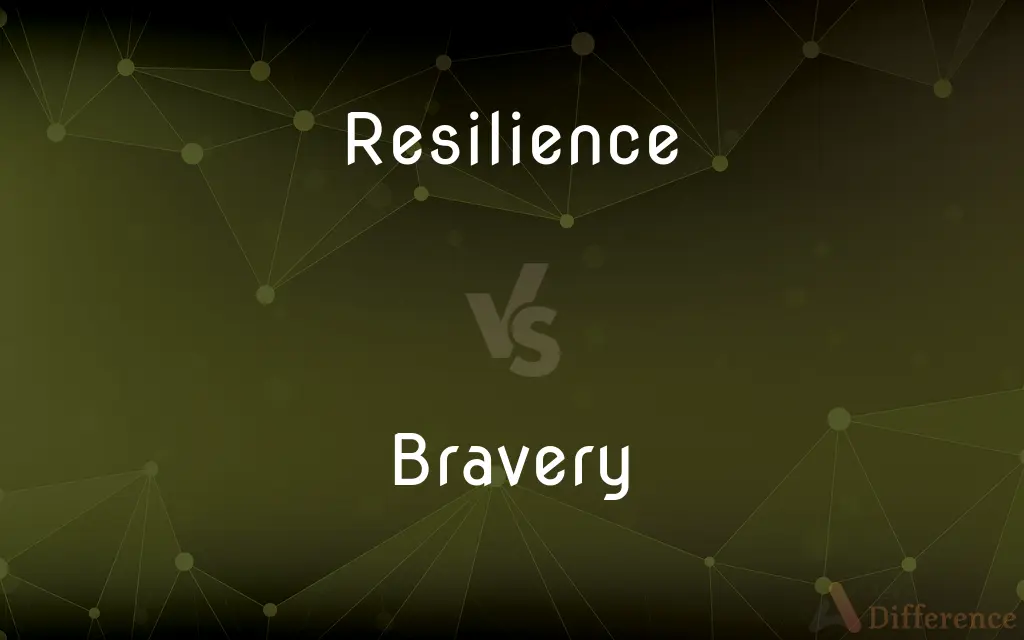Resilience vs. Bravery — What's the Difference?
By Tayyaba Rehman & Maham Liaqat — Updated on April 25, 2024
Resilience involves the ability to recover from difficulties or adapt to change, while bravery refers to the courage to face danger, fear, or difficulty.

Difference Between Resilience and Bravery
Table of Contents
ADVERTISEMENT
Key Differences
Resilience is characterized by the capacity to bounce back from setbacks or adapt effectively to change, highlighting an individual's endurance and flexibility in facing life's challenges. On the other hand, bravery involves confronting or standing up to danger, fear, or uncertainty, often involving a conscious choice to take risks or face fears.
Resilient individuals often demonstrate sustained emotional strength and recovery after experiencing trauma, stress, or adversity. Whereas bravery is typically displayed in acts that may be momentary or prolonged, requiring mental courage to face imminent threats or challenges.
While resilience can be developed over time through experiences and coping strategies, it reflects a long-term adaptation and growth mindset. In contrast, bravery might be seen as a more immediate expression of courage, sometimes spontaneous or instinctive, arising in specific situations requiring bold actions.
Resilience does not necessarily involve direct confrontation with fear or danger but rather deals with enduring and overcoming life’s trials. On the other hand, bravery explicitly involves recognizing fear and choosing to act despite it, which can be a defining moment of courage.
The nurturing of resilience is often linked to psychological well-being and mental health, emphasizing recovery and learning from difficulties. Conversely, bravery is frequently associated with heroism and moral strength, often celebrated in cultural narratives and personal stories of valor.
ADVERTISEMENT
Comparison Chart
Definition
Ability to recover and adapt to difficulties or changes.
Courage to face danger or fear.
Psychological Basis
Linked to emotional endurance and recovery.
Associated with facing fears and taking risks.
Time Frame
Long-term development and sustainability.
Can be momentary or a specific instance.
Focus
Coping with and overcoming adversity.
Confronting fear or danger directly.
Cultural Perception
Often seen as a trait for mental health and growth.
Celebrated as heroism and moral courage.
Compare with Definitions
Resilience
Adaptability and strength in facing life's challenges.
He showed great resilience moving to a new country.
Bravery
Heroic behavior or the ability to face danger and fear.
The firefighter’s bravery saved lives during the fire.
Resilience
The capacity to recover quickly from difficulties; toughness.
Her resilience after the job loss inspired everyone.
Bravery
The quality of being fearless or daring.
Her bravery in standing up to injustice was applauded.
Resilience
Ability to spring back into shape; elasticity.
The resilience of the community post-disaster was remarkable.
Bravery
Moral courage to make a stand or uphold principles.
His bravery in whistleblowing exposed significant corruption.
Resilience
The capability to maintain personal well-being despite stress.
Teaching resilience skills is key in mental health education.
Bravery
Courageous endurance and fortitude.
He showed remarkable bravery during the rescue operation.
Resilience
Endurance and recovery in adverse situations.
Their resilience in the face of economic downturns kept the company afloat.
Bravery
Boldness or readiness to face pain or hardship.
Bravery in critical situations often leads to saving lives.
Resilience
The capacity to recover quickly from difficulties; toughness
The often remarkable resilience of so many British institutions
Bravery
The condition or quality of being brave; courage.
Resilience
The ability of a substance or object to spring back into shape; elasticity
Nylon is excellent in wearability, abrasion resistance and resilience
Bravery
Splendor or magnificence; show.
Resilience
The ability to recover quickly from illness, change, or misfortune; buoyancy.
Bravery
Being brave, courageousness.
Resilience
The property of a material that enables it to resume its original shape or position after being bent, stretched, or compressed; elasticity.
Bravery
(countable) A brave act.
Resilience
The mental ability to recover quickly from depression, illness or misfortune.
Bravery
Splendor, magnificence.
Resilience
(physics) The physical property of material that can resume its shape after being stretched or deformed; elasticity.
Bravery
The quality of being brave; fearless; intrepidity.
Remember, sir, my liege, . . . The natural bravery of your isle.
Resilience
The positive capacity of an organizational system or company to adapt and return to equilibrium after a crisis, failure or any kind of disruption, including: an outage, natural disasters, man-made disasters, terrorism, or similar (particularly IT systems, archives).
Bravery
The act of braving; defiance; bravado.
Reform, then, without bravery or scandal of former times and persons.
Resilience
The capacity to resist destruction or defeat, especially when under extreme pressure.
Bravery
Splendor; magnificence; showy appearance; ostentation; fine dress.
With scarfs and fans and double change of bravery.
Like a stately ship . . . With all her bravery on, and tackle trim.
Resilience
The act of springing back, rebounding, or resiling; as, the resilience of a ball or of sound.
Bravery
A showy person; a fine gentleman; a beau.
A man that is the bravery of his age.
Resilience
The power or inherent property of returning to the form from which a substance is bent, stretched, compressed, or twisted; elasticity[1]; springiness; - of objects and substances.
Bravery
A quality of spirit that enables you to face danger of pain without showing fear
Resilience
The power or ability to recover quickly from a setback, depression, illness, overwork or other adversity; buoyancy; elasticity[2]; - of people.
Bravery
Feeling no fear
Resilience
The mechanical work required to strain an elastic body, as a deflected beam, stretched spring, etc., to the elastic limit; also, the work performed by the body in recovering from such strain.
Resilience
The physical property of a material that can return to its original shape or position after deformation that does not exceed its elastic limit
Resilience
An occurrence of rebounding or springing back
Common Curiosities
Can someone be brave but not resilient?
Yes, a person can display bravery in a moment without necessarily showing resilience to prolonged adversity.
How do resilience and bravery differ fundamentally?
Resilience emphasizes recovery and adaptation over time, while bravery focuses on confronting immediate dangers or fears.
Is resilience inherent or developed?
Resilience can be inherent but is often developed through experiences and coping mechanisms.
How do cultural perceptions of bravery and resilience differ?
Bravery is often glorified as heroism, while resilience is valued for psychological growth and health.
Why is resilience important in everyday life?
It helps individuals manage stress, recover from setbacks, and adapt to changes effectively.
What role does bravery play in leadership?
In leadership, bravery is crucial for making difficult decisions, taking risks, and defending core values.
Are there specific industries where bravery is more important than resilience?
In professions like firefighting, military, and law enforcement, bravery is particularly essential due to the inherent risks.
Can bravery be taught or encouraged?
Yes, through exposure to controlled risks and fostering a culture of courage and support.
How do psychologists measure resilience and bravery?
Through assessments that evaluate responses to hypothetical challenges, past behaviors, and psychological testing.
How do people develop resilience?
Through overcoming challenges, receiving support, and learning coping strategies.
Share Your Discovery

Previous Comparison
Quintillion vs. Quadrillion
Next Comparison
Analyze vs. EvaluateAuthor Spotlight
Written by
Tayyaba RehmanTayyaba Rehman is a distinguished writer, currently serving as a primary contributor to askdifference.com. As a researcher in semantics and etymology, Tayyaba's passion for the complexity of languages and their distinctions has found a perfect home on the platform. Tayyaba delves into the intricacies of language, distinguishing between commonly confused words and phrases, thereby providing clarity for readers worldwide.
Co-written by
Maham Liaqat















































